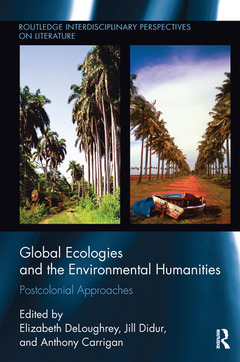Global Ecologies and the Environmental Humanities Postcolonial Approaches Routledge Interdisciplinary Perspectives on Literature Series
Coordonnateurs : DeLoughrey Elizabeth, Didur Jill, Carrigan Anthony

This book examines current trends in scholarly thinking about the new field of the Environmental Humanities, focusing in particular on how the history of globalization and imperialism represents a special challenge to the representation of environmental issues. Essays in this path-breaking collection examine the role that narrative, visual, and aesthetic forms can play in drawing attention to and shaping our ideas about long-term and catastrophic environmental challenges such as climate change, militarism, deforestation, the pollution and management of the global commons, petrocapitalism, and the commodification of nature.
The volume presents a postcolonial approach to the environmental humanities, especially in conjunction with current thinking in areas such as political ecology and environmental justice. Spanning regions such as Africa, Asia, Eastern Europe, Latin America and the Caribbean, Australasia and the Pacific, as well as North America, the volume includes essays by founding figures in the field as well as new scholars, providing vital new interdisciplinary perspectives on: the politics of the earth; disaster, vulnerability, and resilience; political ecologies and environmental justice; world ecologies; and the Anthropocene. In engaging critical ecologies, the volume poses a postcolonial environmental humanities for the twenty-first century. At the heart of this is a conviction that a thoroughly global, postcolonial, and comparative approach is essential to defining the emergent field of the environmental humanities, and that this field has much to offer in understanding critical issues surrounding the creation of alternative ecological futures.
Foreword by Dipesh Chakrabarty
Introduction: A Postcolonial Environmental Humanities Elizabeth DeLoughrey, Jill Didur, and Anthony Carrigan
Part I: The Politics of Earth: Forests, Gardens, Plantations
1. Narrativizing Nature: India, Empire, and Environment David Arnold
2. "The Perverse Little People of the Hills:" Unearthing Ecology and Transculturation in Reginald Farrer’s Alpine Plant-Hunting Jill Didur
3. Bagasse: Caribbean Art and the Debris of the Sugar Plantation Lizabeth Paravisini-Gebert
4. Writing a Native Garden?: Environmental Language and Post-Mabo Literature in Australia Susan K. Martin
Part II: Disaster, Vulnerability, and Resilience
5. Towards a Postcolonial Disaster Studies Anthony Carrigan
6. Nuclear Disaster: The Marshall Islands Experience and Lessons for a Post-Fukushima World Barbara Rose Johnston
7. Island Vulnerability and Resilience: Combining Knowledges for Disaster Risk Reduction Including Climate Change Adaptation Ilan Kelman, J.C. Gaillard, Jessica Mercer, James Lewis, and Anthony Carrigan
Part III: Political Ecologies and Environmental Justice
8. The Edgework of the Clerk: Resilience in Arundhati Roy’s Walking With the ComradesSusie O’Brien
9. Filming the Emergence of Popular Environmentalism in Latin America: Postcolonialism and Buen Vivir Jorge Marcone
10. Witnessing the Nature of Violence: Resource Extraction and Political Ecologies in the Contemporary African Novel Byron Caminero-Santangelo
Part IV: Mapping World Ecologies
11. Narrating a Global Future: Our Common Future and the Public Hearings of the World Commission on Environment and Development Cheryl Lousley
12. Oil on Sugar: Commodity Frontiers and Peripheral Aesthetics Michael Niblett
13. Ghost Mountains and Stone Maidens: Ecological Imperialism, Compound Catastrophe, and the Post-Soviet Ecogothic Sharae Deckard
Part V: Terraforming, Climate Change, and the Anthropocene
14. Terraforming Planet Earth Joseph Masco
15. Climate Change, Cosmology, and Poetry: The Case of Derek Walcott’s OmerosGeorge B. Handley
16. Ordinary Futures: Interspecies Worldings in the Anthropocene Elizabeth DeLoughrey
Elizabeth DeLoughrey is an Associate Professor in English and at the Institute for the Environment and Sustainability at the University of California, Los Angeles. She is co-editor of Caribbean Literature and the Environment (2005), and Postcolonial Ecologies: Literatures of the Environment (2011). She is the author of Routes and Roots: Navigating Caribbean and Pacific Island Literatures (2007) and completing a book about climate change, empire, and the literary and visual arts.
Jill Didur is an Associate Professor in English at Concordia University, Montreal. She is the author of Unsettling Partition: Literature, Gender, Memory (2006), co-editor of special issues of Cultural Critique on Critical Posthumanism (2003) and Cultural Studies on Revisiting the Subaltern in the New Empire (2003), and completing a book about imperialism, gardening, and the environment in postcolonial literature.
Anthony Carrigan is Lecturer in Postcolonial Literatures and Cultures at the University of Leeds. He is the author of Postcolonial Tourism: Literature, Culture, and Environment (Routledge, 2011), and is a Fellow of the Rachel Carson Center for Environment and Society, Ludwig-Maximilians-Universität.
Date de parution : 09-2016
15.2x22.9 cm
Date de parution : 05-2015
15.2x22.9 cm
Thèmes de Global Ecologies and the Environmental Humanities :
Mots-clés :
UN; Research; Extrahuman Natures; Literature; National Academy; Ecology; RMI; Environment; DRR; Postcolonial; La Deriva; Environmental Humanities; Extra-human Natures; Nature; Buen Vivir; Global; Energy Source; Climate Change; Slow Violence; Disaster Studies; Ecocriticism; Environmental Humanities Research; Good Life; Political Ecology; Radioactive Fallout; Postcolonial Ecocriticism; Walcott's Poetry; Capitalist World Ecology; FCDA; Alpine Gardening; Young Man; Royal Palms; Commission's Public Hearings; Vice Versa



